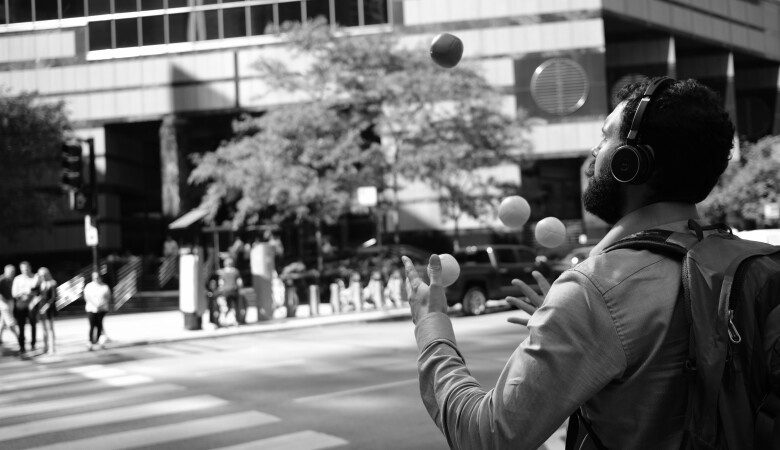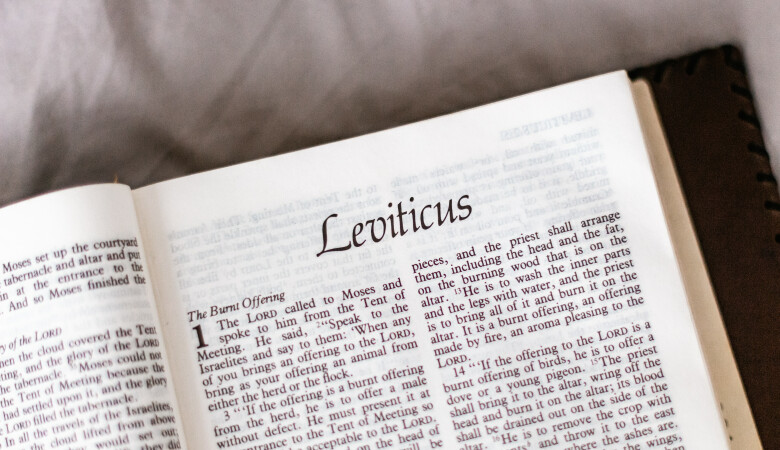The Unchangeable Promise of God, the Anchor of Our Souls (Hebrews Sermon 24 of 74)
April 03, 2011 | Andy Davis
Hebrews 6:13-20
Salvation by Promise, Covenants, Assurance of Salvation
The Strong Anchor in the Storm
Wednesday, May 21, 2003, a date that probably isn't all that important to you, but on that day, a massive earthquake hit Algeria. That earthquake measured 6.8 on the Richter scale and killed over 1000 people. 150 miles away there was a yacht anchored in Porto Petro Bay in Majorca, Spain, and it was hit by the violent aftershocks of that earthquake. The yacht was buffeted fiercely by the waves as were 10 other yachts that were moored nearby. Now all 10 of those yachts were ripped from their mooring and crashed into one another and into the rocks of the harbor, totally destroying each one, but that one yacht's anchor held firm for two hours as it was being lashed by the waves. Moored by a new kind of anchor and cable system, the strongest anchor ever designed for a private yacht, and because of the special design and strength of that anchoring system, the yacht and everyone on board was saved from death.
Now, it is very common for us as Christians to use language like the storms of life to talk about things we're going through. We go through storms of life. That kind of thing and, frankly, Scripture supports that kind of language. Ephesians 4:14 uses this kind of language. Talks about immature people in that particular context, whose hearts are not rooted in sound doctrine, saying that they're tossed back and forth by the waves, and blown here and there by every wind of teaching. James 1:6 uses similar language of those who doubt God's promises, "But when he asks, he must believe and not doubt, because those who doubt are like a wave of the sea blown and tossed by the wind." And such people should not think they'll receive anything from God, they're double-minded, unstable in all their ways.
Now, in our text this morning, in Hebrews 6:13-20, God is laboring to give each believer in Jesus Christ, a sense of the strength of our anchoring system in Jesus, that we have an anchor that holds within the veil. That's the burden of this text; and as we face incredible trials that assault our faith, our anchor is going to hold us close to Christ. Now, God has made us astonishing promises that if we believe in Jesus Christ, who was crucified for sin, that if we believe in Him, He will forgive us all of our sins, and that He will protect us in all of the storms of life. He'll guide us through our lives. He'll guide us even through death, and He will welcome us into Heaven. And then at the end of the world, He has promised that He will raise our rotted corpses up from the grave and He will give us gloriously perfect resurrection bodies and that we will live in a perfect new world called the new Heavens and the new Earth and we will live there forever and ever. What incredible promises are lavished on the believer in Jesus Christ!
But we have not received those promises, not all of them yet. The fulfillment is yet to come. And now our faith is being assaulted, buffeted by the waves of trials and temptations. We're assaulted by lust, by a guilty conscience, by the accusations of the evil one. We're assaulted by illness and pain, struggles of many kinds. God wants us to know that our souls are firmly anchored to Him through Jesus Christ and that He's not going to lose us. Through the finished work of Jesus Christ on the cross, and by the strength of His ongoing priestly ministry for us behind the veil... We're going to learn more about that in the next chapter, but through the ministry of Jesus Christ, that which has finished and that which is ongoing, we are securely tied to God Almighty.
And even beyond that, you may be feeling like you're like your life is on that yacht, that one that didn't drift away and that you're buffeted, and smashed by all kinds of things right now, maybe like you've hit your head on a bulkhead, because of the convulsing waves, you see the blood is running down into your eyes perhaps, metaphorically speaking. Maybe you're going through the worst trial of your life, maybe it's just average, but you're wondering when those kinds of trials are come. So often we live a lot of our lives waiting for the other shoe to drop. You hear about things that are going on in brothers' and sisters' lives. You know that God doesn't love you any more than He loves them. And we can live in fear in that way, of trials that God will feel are necessary but hasn't come yet.
God Wants His People to Be Filled With Hope
God wants us to be filled with hope every day, filled with a radiant bright, strong hope in Jesus Christ. God is greatly glorified by hope. When we are filled with hope, He's glorified by that, when His children are buoyant. I get a picture of buoyancy of hope. And what is hope? I was just talking to Matthew before I came up here. How would you define hope when we're talking about that? And I wanted to make a distinction between sources of hope and the thing itself, and then the effects of hope. What is hope itself? And we're going to talk about that today, but I believe it's an attitude or disposition of the human soul of the heart. God loves hope, He loves it. And you are here today, I think, to have an infusion strengthening your hope. You're here to be fed today by the word of God so that when you walk out of here, you're hopefully stronger than when you walked in. That's my desire, because that's God's desire in the text. And in order to achieve that, God is going to give you a series of encouragements to hope in the text. He wants you to know that the anchor of your soul will almost certainly hold firmly, it will not fail you until at last, you are in the safe haven of heaven itself.
I. Central Lesson: Only by Faith and Patience Do We Inherit the Promise
So let's start with the central lesson. The central lesson I think of the whole book, but even locally as we've been looking recently at Hebrews, is this: Only by faith and patience do we inherit what is promised. Okay, the overall, the context here, the overall context of the Book of Hebrews, we've seen a number of times, I believe this letter was written to a local church, it was made up of Jewish believers in Christ, those Jewish believers in Christ were under tremendous pressure. The pressure was coming I think from their friends and neighbors, and relatives, and political and religious leaders that were pressing on them toward one end. And the pressure was for them to give up their claim to be Christians and just return to Old Covenant Judaism. Just give up on Jesus, turn their backs on Jesus and go back to the way things used to be.
And the author is writing a strong word of exhortation, that they would not do that. And he goes about his work by showing the great majesty of Jesus Christ, the superiority of Jesus Christ to everything as Creator of the universe, as the One superior to all of the prophets of the Old Testament, as the One who in fact fills up the message of all of the prophets, the One who is superior over every angel, infinitely greater than any angel, the One who's superior to Moses himself who was just a servant in God's house but Jesus is a Son over God's house. Superior to Aaron, superior to Joshua, superior to all of these heroes of the Old Covenant, each one of them having a specific role in redemptive history. Joshua leading the people of God into the Promised Land. Jesus is a better Joshua, leads us into a better, a more permanent Promised Land. Aaron a high priest chosen from among man to offer gifts and sacrifices, Jesus a greater high priest in the order of Melchizedek. We'll go there next chapter.
So we're seeing the greatness of Jesus Christ, and the greatness of the covenant that He brings. And how can you turn your back on Jesus and go back to a Christ-less Judaism, how can you do that? And the immediate context: Hebrews 6:11-12 says, "We want each of you to show the same diligence to the very end, in order to make your hope sure. We do not want you to become lazy, but to imitate those who through faith and patience inherit what has been promised." So that's the context. Only by faith and patience do you inherit the promise.
So the Christian life is presented as a marathon race, and we must keep running that race. We'll get to that image in Chapter 12, but we must lay aside every hindrance and run with endurance, this race that's marked out in front of us. We have to keep running this race, we can't quit in the middle of it. To run for a while and fall out of the race is unacceptable, it really proves you weren't genuinely running the true race of faith. And so the author is warning these people against spiritual laziness. "We do not want you to become lazy," he says. The word lazy, the same word we saw in the Greek translation of the book of Proverbs to refer to the sluggard, that individual can't even lift up his hand out of the dish, who's laying in the bed, going from side to side, is making excuses, "There's a lion out in the streets," or "I'll be trampled down if I try to do anything today," this kind of thing. The sluggard, one of my favorite or least favorite individuals in Proverbs. It never fails to bring a smile and conviction at the same time.
But we're not to be sluggards, we're not to be lazy in our Christian lives. They had become lazy listeners, they were listening to good apostolic teaching, the faithful exposition of the Word. But they were lazy listeners, they were just sipping at milk, they didn't want to go deeper, they didn't want to chew on the meat of the Word. Still less, do they want to obey those things that they had learned. They had become lazy. Hebrews 5:11, "About this we have much to say, but it's hard to explain because you've become in effect lazy listeners, dull of listening." This is devastating because faith comes by hearing, doesn't it? And we've got to keep hearing, keep listening to the Holy Spirit as He speaks out of the Word. We've got to keep listening to God talking to us, so that our faith will be strong and will not fail. And so it says in Hebrews 3, "So as the Holy Spirit says Today, if you hear His voice, don't harden your hearts," you got to keep listening, keep hearing the Holy spirit speak.
So the author speaks about imitating people. The heroes of the faith he's going to lay out in Hebrews 11. We got to imitate those who through faith and patience inherit what has been promised. And especially in view here, one of the central figures of the Old Testament heroes of faith is Abraham. We're going to talk about Abraham today, but this individual, this father in faith, Abraham our father in faith, and he's going to be laid out before us as an example of somebody who received promises, and by faith in patience inherited those promises. So the author speaks in verse 11 of making your hope sure, that hope is a character trait of the heart. It's a joyful expectation of a blessing that hasn't come yet, but you think it's going to come. That's what hope is, both secular and spiritual. It's just an expectation that the future is bright, something good is coming.
I'll talk more about that in a minute. But that's the character trait, and hope is a precious commodity of the soul, and in order to make your hope sure means to get the thing you're hoping for. It takes diligence then, it takes zeal, it takes earnestness; and these precious traits of soul are very much in the author's view right here, been thinking about this, how much Satan labors to get Job to stop believing in God, but curse God. That's what it's all about, it's Job's heart and what Job is feeling and thinking and believing about God, that's what the whole thing's about. He's trying to get Job to stop trusting God and to curse Him to His face. And that's the same thing in Luke 22, "Simon, Simon, Satan has demanded to sift you like wheat; but I prayed for you Simon, that your faith may not fail."
The battle's for your faith, it's for your heart, that you'll keep trusting and keep hoping, that's what's going on in your life right now. That's what the temptations are all about, that's what any trials you're going, it's all about that, that your faith may be strong, that's what Jesus is praying for you.
II. God’s Goal: Our Strong Encouragement to Hope
That's what I think Hebrews 6:13-20 is all about too. And so God's goal here is our strong encouragement to hope. Look at verse 18. We're going to go through it carefully and systematically but let's get to the point. And the point is "God did this so that by two unchangeable things in which it is impossible for God to lie," we'll talk all about that. "We... " We Christians, "We who have fled to take hold of the hope offered to us may be... " And here's the point, "greatly encouraged." That's the NIV's translation. That's the point, the author wants you, God wants you greatly encouraged today. ESV gives us, "strong encouragement." KJV says, "strong consolation." That's the goal in verse 18. I think it's the goal of the whole letter.
In Hebrews 13:22, he tells us why he wrote the letter. "Brothers. I urge you to bear with this word of exhortation." Same Greek word. "For I've written you only a short letter... " A 13-chapter letter? What letter writers they were back then. They didn't do the Twitter thing. It was a 13-chapter letter. "Much to say." He thinks, "Look, I'm just going to shorten it to this brief letter now, just keep it short." The letter of Hebrews. But it's the Greek word is paraklesis, paraklesis. It's a rich, beautiful full word. It's related to Jesus' word for the Counselor or Comforter. Paraclete. Sometimes it comes over by transliteration in English, paraclete, paraklesis, one called alongside to help. But that word "help" is too pale a word for me, He does more than just help. He is the Sovereign God, the third person of the Trinity in your life, the Paraclete, but sometimes the Paraclete rebukes, sometimes He consoles, sometimes He exhorts, sometimes He encourages. All of that is within the pale of this word paraklesis, He does whatever is necessary to keep you running your marathon race, whatever it takes to keep you running this long-distance race.
And in Verse 18, the author intensifies the word. He adds the adjective "strong," or translated mighty or powerful or effective consolation or exhortation. And in this passage, the author is saying that God gives us two unchangeable things in which is impossible, it is impossible for God to lie, and through that, you get this strong consolation or strong encouragement. What are those two unchangeable things? His promise and His oath. Those are the two things He gives us: The promise and the oath. They're unchangeable, unbreakable, and they're the basis of this confident hope that we have. Combine effect then of these things should give us a strong encouragement to persevere in the Christian life. Friends, this is effective medicine, but it only if you take it. You have to take the medicine to have the effects of these words, you take it by faith. God is giving you words here, He's giving you words, and the words have to be like food, have to be chewed up and swallowed and digested to give the benefit to the body. So you have to work over these things. So we're working over words. That's what preaching is, that's what teaching is, that's what Bible study is. We're going over the words, and we're working over this meat and trying to take it in, so we get stronger. This is the food that God has given us.
Meditating on God’s Promises Fosters Hope
And by meditating on these verses, we can have with the author, what God wants to give us, a strong encouragement to hope during the Christian race of faith. So what is this hope? A hope just itself is a disposition of the human heart. It's a positive force in the heart, an optimism, let's say, a confidence, an assurance, it always has to do with good things in the future. Hope always has to do with good things in the future. Romans 8 says, "Who hopes for what he already has?" You're not hoping for present things, stuff you already have. You can be thankful for present things, but you don't hope for them, you already have them. So you don't need to hope for what... So it has to do with what you don't have yet, and it has to do with good things. You use the word dread for things that are coming in the future that you don't want, or other such things. So this is good things coming in the future and your hope is based on your certainty of whether those good things will come or not.
I think in everyday life, hope functions somewhat like a... There's a picture of buoyancy in my heart right here, a sense of, you just can't get this individual down, Satan trying to shove you down and you just keep popping up to the surface. I remember swimming in a strange Salt Lake in the Pakistan, in the mountains of Pakistan, one of the most other-worldly experiences I've ever had in my life, and I just couldn't submerge. I remember going down and popping right back up again, I just couldn't get down in this water. It was really interesting, I was floating kind of really high up in this lake and looking at these mountains, it was amazing.
I remember a darker time in my life, when I was a sophomore in college, and I went out sailing on a very windy day and I had a life preserver on but it wasn't tied. It was just kind of hanging on my neck. Very windy day and the sailboat capsized, and I got thrown from the sailboat, and actually the centerboard for the sailboat got thrown even further, and I went swimming after the centerboard, almost killed myself. Literally almost killed myself. So I went out and got that centerboard and turned and the sailboat had been blown away from me. It was in the middle of Lake Winnipesaukee in New Hampshire and I started swimming with one arm, but it was, I wasn't even keeping up with the boat. And here's this life preserver just kind of floating around my neck, just floating there, not doing me any good at all, and I lived, praise God, that's not the point of the sermon. But anyway, I did survive. It was tough, I almost drowned. Somebody pulled me dead weight out of the lake into a motorboat. But I think this is where Christians are, where we don't tie the promises of God around us and have the buoy us up and lift us up, and so we threaten to sink because you're not clinging to the promises of God. So I think of hope in terms of a buoyancy. It's more than just mere optimism, but it is that of the future.
So, I think in everyday life, just secular, sacred, whatever human life, there are three types of hope. All of them have to do with future things, good things in the future that you don't have yet. There's short-term hope. There's long-term hope and there's eternal or... Yeah, eternal hope I guess we'll call it that. Short-term hope is: Things are looking really good for the rest of the day. Okay, you're going out to your favorite restaurant with some friends afterwards, you looking forward to that, it's going to be a good time, you're excited, whenever this pastor will finally get done with this, you're going to go out and have a good time and you'll be free at last to go and enjoy sometimes. Look, that's all fine. Well, most of that is fine, but you know what I mean.
The expectation that the next day or so is going to be good. Short-term hope. Long-term hope is that the rest of your life looks good to you. You like your life. You like what's going on in your life. You're anticipating that good things are going to happen in the future, that it's going to be a fruitful life, a good life. This is the kind of hope that's very common on a new couple's wedding day as they walk out of the church, they get in the car and they drive off to their honeymoon. They're filled with hope, long-term hope, they're going to have a wonderful life together, they're going to enjoy their married life together. It's going to be a fruitful time. That's the long-term hope, they're anticipating good things for the rest of their life.
Then there's eternal hope. It has to do with life after death, has to do with death itself and what will happen when you die, and if you have a hope that is eternal, that after you die, that there is a place called Heaven and that you'll be welcomed there and received there and it's going to be glorious and wonderful, and you just can't wait to be there. That's eternal hope. I think the gospel offers all three to Christians, based on far better things than non-Christian people have. I think all three are worthwhile. I think counselors should be and really are working to giving people hope. And the Bible says that people without Jesus are without hope and without God in the world. They may look forward to what's going on the rest of the day, but the future looks dim to them. They're depressed, they've seen bad things happen. Perhaps that marriage didn't work out, perhaps that business venture failed, they've seen enough of life and now they're just depressed and beaten down.
I think even about what I saw in Haiti recently, when we went there, and you look at these people living in these tent cities. And I think if I'm living there, what does my long-term hope look like? The political situation there's terrible. The economic future is bleak. The greatest hope that any of them have is to just get out of there and go live with some relatives in Miami, or New York, nobody wants to be there, they want to get out, etcetera. It's just so bleak. I think it's just beautiful, isn't it? How the Gospel can come and minister hope in all three areas, but especially eternal hope; and when you have eternal hope, then it's easier to have life hope. And when you have those two then today can fit into that overall plan of God.
I don't think any Christian should ever allow himself or herself to be hopeless. That is not the mark of a Christian. You should feed your hope, and this text shows you how to do it, it feeds on the promises of God. Hope is of the essence of faith as it says in Hebrews 11:1, "Now faith is the assurance of things hoped for and the conviction of things not seen." And that hope in Hebrews 11, those people were looking forward, they were looking ahead to a city with foundations whose builder and maker is God. That's eternal hope, and because of that, they live their lives in that kind of expectancy.
Moses said No to the flesh pots of Egypt and said, "I'm going to live a certain kind of way because I'm looking forward to the city with foundations. I want to live a holy life because of it." And hope is necessary because God isn't going to give it to you in this life. You don't get the centerpiece of our faith now, you don't. You'll die, you'll die. If Jesus doesn't return in our generation, you will die not having had the central hope of your life fulfilled, but you'll die happy, you'll have fed your hope your whole life as saying, "I never expected to get it in this world. It was for this very thing that Jesus brought me to this point and I'm looking forward." You can die happy, and people around you who aren't Christians, who are without hope, without God in the world, will think you a marvel. How is it you can die so happily? It's because of the hope I have in Jesus.
III. How God Gives Us Strong Encouragement to Hope
That's what the author wants to give you. How does he do it, what does he do, what buoyant things does he put around our necks and around our bodies and around our heads to lift us up so we don't drown? I think he does six things. And I want to just go through them relatively quickly here, but there's six things here that just give us a strong encouragement to hope.
First, the promise of God, second the oath of God, third the character of God, fourth the example of Abraham, fifth the fulfillment in Jesus, and then, ultimate fulfillment in heaven. So first, the promise of God, and we start right away in verse 13, when God made His promise to Abraham, focuses right away on the promise. Verse 14 it tells us what that promise is, literally this: "Surely blessing I will bless you and multiplying I will multiply you." That's a literalistic translation. KJV has it. Others just say, "I will surely bless you," but it's literally "Surely blessing I will bless you and multiplying I will multiply you." The way I kind of read it that way is, blessing I will bless you: I've already blessed you, I'm going to ultimately bless you. And multiplying I will multiply: I've already begun to multiply, you I'm going to multiply you even more.
Now this promise was made in Genesis 22, on Mount Moriah, where Abraham had obeyed an incredibly difficult command God had given him to take his son, his only son, Isaac, whom he loved and offer him as a sacrifice. And Abraham by faith obeyed and went, he went up the mountain, he was just about to kill his son, and the angel of the Lord stopped him and said this incredible thing, "Now, I know that you fear God because you have not withheld from me your son, your only son." And then he said this, "I swear by myself, declares the Lord, That because you have done this, and you have not withheld your son, your only son, I will surely bless you and make your descendants as numerous as the stars in the sky, and the sand on the seashore. Your descendants will take possession of the cities of their enemies, and through your offspring, all nations on earth will be blessed because you have obeyed Me."
Now, the promise is a source of hope. How is that? Well, God made His promise to Abraham and it was a source of Abraham's hope. Now, a promise is a pledge of a good thing to be given in the future. Also, like hope, promises have to do with the future; and so one individual makes a promise to the other, "I will surely do this for you, this is a promise I will make for you." Perhaps the most significant promise you make to another person is the wedding vow itself. You're promising certain things in your wedding vows, a promise a man and woman make to each other concerning future blessings that they'll most certainly do for one another. They will love and cherish each other, they'll share their worldly goods together, they'll care for each other in good times and bad, forsaking all others, they will cling to that one person till death parts you. These are the promises that they make to each other.
Parents make many promises to their children, "I promise I'll take you to the State Fair next weekend if you get an A on that test." Something like that or "I'll take you out for ice cream." Or "When you graduate from high school, I'll give you a new car." Amazing how good our children's memories are of those promises. It's incredible, deep multi-faceted promises, and they remember them all, the codices and the fine print, they remember all of those promises. The commands, not so much I found. But the promises absolutely. God fills the pages of Scripture with more promises I think that we can possibly count. Some have tried to count them.
One Canadian school teacher, name of Mr. Storms, Everett Storms from Kitchener, Ontario, read through the Bible. On his 27th time of reading through the Bible in his life, he decided he was going to pursue the promises through the whole Bible. He came up with almost 8000 promises, same list that Herbert Lockyer gives us, about 8000 promises from God to us in the pages of Scripture. Promises that God gave related to the Jewish world, to the Gentile world, connected with creation, promises connected to the coming of Jesus Christ which our young people studied so beautifully in Disciple Now, what a great time of studying the promises of God. But God has fulfilled His promises in bringing Jesus, beautiful promises for the individual, Christian promises for local churches, the church as a whole. Promise is connected to prayer, promise is connected to marriage or parenting, so many rich promises of God scattered throughout the Bible, like so many gems.
2 Peter 1:4 calls them the very great and precious promises of God. Charles Spurgeon likened them to checks that God had signed and had given to you. He wrote a whole book in which he draws out a lot of these promises. "Faith's Checkbook," he calls it, "Faith's Checkbook." And so God's handed you all these checks. Have you ever gone through the junk drawer? Do you guys have a junk drawer like we do where you put a lot of stuff? And you find a check... Maybe that's never happened to you. Why am I telling you this story? At any rate, there's a check, it's never been submitted to the bank, there it is. Maybe past its time, but the fact is it's got a date on it, it's got an endorse... A certain amount, and you bring it to the bank and you give the check to the cashier; and after the procedures they follow, they want to see that it's endorsed, the date, and it has to clear, and then you get the money.
And so it is with the promises of God, Charles Spurgeon tells us. You have to endorse it with your own faith, you have to take it into yourself by endorsing it by faith. You have to bring it to the cashier, you have to bring it to God, the one with the money. Present it to Him in prayer, He has to check the date and He may tell you not yet but so you wait patiently as Abraham did, you have to wait on that, the time of the clearance of that check, or the date when God will give you that good thing. You wait patiently for what is promised. It's very much like a check.
The Ultimate Promise of God
Now there are 8000 promises, but I tell you there is one promise in the Bible, one central overarching promise in Jesus to us as sinners. It's called salvation in a big picture. The promise of salvation. I will save you from everything that sin has done to you, to your relationships, to the universe you live in. I will bring you into a world where sin will be no more, I will do that for you, I will save you. And He sent His Son Jesus who shed His blood to pay for the penalty of our sins that we would be forgiven and He was raised to life on the third day to give us a pattern. He is the first fruit of resurrection and so here is the promise. Capital P. Resurrected souls in resurrected bodies living in resurrected fellowship with other such people, in a resurrected universe, the new Heavens and new Earth. That's the promise.
All the other smaller promises fit into and serve that larger overarching promise, that's the ultimate promise that God gives you, and that promise is extended here, many descendants as numerous as the stars in the sky. He says. He said, "I will bless those who bless you and whoever curses you, I curse, and all peoples on earth will be blessed through you." That's feeding that main central promise of salvation through Jesus Christ.
The ultimate promise to Abraham then he would be heir of the world, Romans 4:13, "It is not through law that Abraham and his offspring received the promise that he would be heir of the world, but through the righteousness that comes by faith." Jesus is the fulfillment of the promise to Abraham; and through Jesus, we gentiles have become heirs to the promise of Abraham, we have become heirs through Abraham. We are by faith sons and daughters of Abraham, isn't that beautiful? Galatians 3 says, "You are all sons of God through faith in Jesus Christ, if you belong to Christ then you are Abraham's seed and heirs according to the promise." Oh how sweet is that. And the promise there is that big overarching promise of salvation. So this passage... Look at verse 17, this passage calls us heirs. Look at Verse 17, "Because God wanted to make the unchanging nature of his purpose very clear to the heirs of what was promised, He confirmed it with an oath." So we are the heirs of the promise here. And so we have this promise as a ground for our, a ground for our hope.
God’s Oath
Secondly, we have the oath of God. Verse 13, "When God made his promise to Abraham, since there was no one greater for him to swear by, he swore by himself." "I swear by myself," He said. The reason for the oath is given in verse 16, "Men swear by someone greater than themselves, and the oath confirms what is said and puts an end to all argument," or all churning or disputing, or talking back, that's literally what it is, puts an end to that. I think that's metaphorically for the spiritual aspect of our hearts, we talk back to the promise of God, don't we? We murmur against it, we argue against it. We think it might not happen. We think it's not going to come true, we struggle with it. And so, this oath was meant to put an end to all argument. An end to all disputing. Doubt murmurs, doubt talks back. Doubt argues with God. God meant to put an end to that. And so, He confirms this with an oath, "I swear by myself."
And the reason God swore by Himself, the author tells us, is there was no one around greater that He should swear by. There's no one... God has studied the universe and there is no one greater than Himself. He knows that by a long shot, by an infinite shot, He is infinitely greater. There is no one greater than God, there's no one even like God, or even close to God in infinite majesty and power, and so He swore by Himself. Why did He do it? Look at Verse 17 and 18, "Because God wanted to make the unchanging nature of His purpose very clear to the heirs of what was promised, He confirmed it with an oath. God did this so that by two unchangeable things, the promise and the oath, in which it is impossible for God to lie, we who have fled to take hold of the hope offered to us may be greatly encouraged." That's why He gives us a promise and an oath.
So the bottom line is, God is laboring for our assurance, our confidence, our faith, our hope. So, He does these two things, He makes a promise and He confirms it with an oath. Thirdly, we see the character of God. Now, the key to all of this, is the character of God. Liars make and break promises all the time, don't they? We have that experience. Liars swear oaths on stacks of Bibles. And as I've said before, recently, my confidence doesn't go up if you add another two Bibles on top of the stack, does it, yours? I think the taller it is, the lower my confidence is. Is that how many Bibles you need to convince the people who know you that you're telling the truth?
"Just let your Yes be Yes," said Jesus, "And let your No be No." But God helping us in our weakness here, swears by Himself. And so what kind of being is it, that's making us these promises? Well, look at the character of God, our hope is based on three particular attributes of God, God's truthfulness, His omnipotence, His power and His immutability, His unchanging nature. So truthfulness, power and His unchanging nature, these are the attributes of God that give us confidence when we come to the promises of God.
The Character of God
First, His truth: If God were a liar, we would have every good reason to doubt His keeping of His promise. But Verse 18 says it's impossible for God to lie.
The Omnipotence of God
Secondly, if God were not omnipotent, if He were not all-powerful, we would have good reason to doubt His promise. As a matter of fact, I've heard that kind of murmuring about God in the wake of the earthquake in Japan. Is it the case that God is not powerful enough to prevent these kinds of things? We could say concerning the promise. Well, He meant well, He really did, but He just couldn't bring it about. But this is the God of the universe who sustains all things by His powerful word, everything exists to serve Him and He exerts power on it at every moment to keep the universe going. There is nothing He cannot do. So God's omnipotence, He can most certainly keep this promise.
The Unchangeableness and Faithfulness of God
Thirdly, God's immutability. We could say, "Look, God certainly meant it at the time, He wasn't lying, He really had every good intention to keep His promise and He certainly has all power to keep it, but now He has changed His mind. But the author gives us twice in verse 17, he talks about the unchanging nature of His purpose. God will not change His mind. And verse 18, these are two unchangeable things. God Himself cannot change this purpose.
It says in Hebrews 13:8, "Jesus Christ is the same yesterday, and today and forever." That's immutability language. He never changes. James 1:17 speaks of the Father of the heavenly lights, who doesn't change like shifting shadows. Unlike us, humans who speak frivolous words and make spurious promises that, number one, we never intended to keep to begin with, because we're liars. Or number two, we meant to keep, but we couldn't. We lacked resources or circumstances overcame us, or we died or something happens, and we could not carry it through. Or number three, we meant to keep them and we had opportunities but we have now changed our mind, and things seem differently to us now than when we originally made the promise. None of that will happen with God. God keeps His promises, so therefore you can have a good hope based on the character of God.
Abraham’s Example of Faith and Patience
Fourth, look at Abraham's example of faith and patience. Verse 15. "And so after waiting patiently, Abraham received what was promised." You're not going to get it today, probably. You might if you die, but God tests our faith by not giving us the thing He has promised. He makes us wait and wait and wait. And so Abraham teaches us how to wait patiently. He waited 25 years for that boy, for Isaac to be born. 25 years he waited. Romans 4:19-21 tells us how he waited, it says, "Without weakening in his faith, he faced the fact that his body was as good as dead since he was about a hundred years old, and that Sarah's womb was also dead. Yet he did not waver through unbelief regarding the promise of God, but he was strengthened in his faith and gave glory to God because he was fully persuaded that God had power to do what He had promised."
That's how we wait, we wait on God knowing fully that God can do this, we don't waver or flicker, we just have confidence that God has power to do what He has promised for us. But this promise goes well beyond the birth of Isaac, doesn't it? He made this promise long after Isaac was born. "Blessing I will bless you, multiplying I will multiply you," I've only begun to bless you, Abraham, I've got far greater blessings than this to give you, Abraham. I want to multiply you far more than this one boy, Abraham. I want to give you lavish things. And so, these promises, this is ringing in his ears, even as he's dying, even as he lays his head one last time on his pillow, he's still filled with faith and with hope, because the promises were for the future anyway, he's looking ahead to a city with foundations whose builder and maker is God.
He's going to inherit the Promised Land, it's just going to be an eternal inheritance, not the one under Joshua but an eternal one. The new Heavens and the new Earth. And we all are heirs with him, amen? We're going to get it too. The meek will inherit the earth, it's going to be ours. So Abraham gives us an example of how to wait patiently for God.
The Life, Death, Resurrection, and Ascension of Jesus: Fulfillment of the Promise
Fifth, the life, death and resurrection, ascension of Jesus. He is the fulfillment of the promise. Look at verse 19-20, "We have this hope as an anchor for the soul, firm and secure. It enters the inner sanctuary behind the curtain where Jesus who went before us has entered on our behalf. He has become a high priest forever in the order of Melchizedek." God here feeds our hope by pointing to Jesus, the author of our faith, the protector of our faith. He is the focus of our hope. Isn't He what you want, dear Christian brother or sister? Isn't Jesus what you want?
Oh, just give me Jesus, I want to see Jesus, I want to be with Him, I want to hear His voice, I want to feel His embrace, I want to walk with Him in the world He's made, whatever it looks like will be fine with me. It's perfect, it's wonderful, but it's Jesus I want, and I want to see that city radiating with His glory. Don't you want to see that? I want Jesus. And so we focus on Jesus, the one who shed His blood on the cross, the one who went behind the curtain, behind the veil, and ministers now as a High Priest. He is there on our behalf, He is the anchor that holds within the veil, and no hurricane is going to pull you away from Jesus. You'll not drift away, you'll not turn away, you will not fall away because Jesus has hold of you and will not let you go.
So the ultimate source of our hope is meditating on heaven. Think much about heaven, think much about the future, expect trouble here on Earth, expect pain and suffering, expect God to purify your faith and bring trials in your life, expect it all, He's perfecting you for heaven, and set your hope fully on that grace to be given you when He returns. Die in hope, please, I plead with you die in hope. Filled with hope. Be a witness to your children, be a witness to your grandchildren, be a witness to the medical professionals that are caring for you. Die in hope. In order to do that, feed your hope today, feed it today.
IV. Application: Let God Feed Your Hope!
Maybe you came here today, you don't have any hope. You are what we've already described, without hope and without God in the world. You're not a Christian. Maybe even consciously you know, "I'm not a Christian." Or maybe you feel that I've been playing a game and I don't think I'm a Christian. The gospel is calling out to you, the gospel stands to give you a real living hope today in Jesus. He's the one who shed His blood for you, He's the one that was raised to life on the third day, He wants to give you hope. Trust in Him and all your sins will be forgiven. Justification by faith apart from works, just put your trust in Him. And then can I urge you, feed your hope, dear Christian friend, feed it with the word of God. Go back to the promises, work over the... All we've been doing since I got up here is just working verse by verse, phrase by phrase, that's all we're looking at. Feed on the promises.
Understand that God has sworn by Himself, He will certainly forgive all your sins, He will certainly protect you and filter your temptations while on Earth. He will certainly enable you to be fruitful while you live, He will certainly bring you through death, He will certainly welcome you into heaven, when you are absent from the body and present with the Lord, and He will certainly raise that body of yours in newness of life, made like Jesus' resurrection body, and He will certainly do it, not just for you, but for a multitude greater than anyone could count, from every tribe, and language, and people, and nation, they will certainly be there too. Millions of them. And we're going to be in a resurrected world, it's going to be purified by fire and made new and made beautiful and radiant, with the glory of God, and we will walk in resurrection bodies in fellowship with Jesus and with the saints. We're going to be there, friends.
your faith, God will certainly keep His promises, and know that your anchor is going to hold within the veil, it's going to hold. Romans Chapter 8, "I'm convinced that neither death nor life, neither angels nor demons, neither the present nor the future, nor any powers, neither height nor depth, nor anything else in all creation will be able to" sever your line to your anchor. It cannot be severed, it cannot.
Why is He behind the veil? He is your High Priest, He's entered behind the veil. Because it's not time for you to see Him yet, you need faith. And so your anchor's holding behind the veil, and sometimes God will be invisible, incognito to you, you'll wonder where is God in all of this. The anchor's holding within the veil because Jesus is there ministering, invisible. Trust in Him. Though you do not see Him, you love Him. Though you do not see Him, know that He will never let you go. Close with me in prayer.






























